|
|
|
Sort Order |
|
|
|
Items / Page
|
|
|
|
|
|
|
| Srl | Item |
| 1 |
ID:
192052
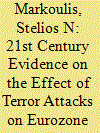

|
|
|
|
|
| Summary/Abstract |
This paper uses the event study methodology to examine whether ‘significant’ terror attacks that occurred in the Eurozone in the 21st century affect stock markets. We find that such events do have a negative effect both on the market of the country suffering the attack, and on the general Eurozone market index. Depending on the method and the market index used, this effect ranges between −0.3% and −0.62% and is concentrated entirely on the day of the attack. We moreover find that this effect is more pronounced and of significance during the first decade of the 21st century. Regression analysis revealed that the most important factor affecting the magnitude of the effect is economic damage resulting from the attack.
|
|
|
|
|
|
|
|
|
|
|
|
|
|
|
|
| 2 |
ID:
192049


|
|
|
|
|
| Summary/Abstract |
In recent years, geopolitical risk (GPR) has been a crucial factor in investment decisions and stock markets. Therefore, we explore the research on the GPR by employing bibliometric and scientometric analytical techniques. We find 366 scientific contributions in December 2021 from the Scopus database by searching ‘Geopolitical risk’ in abstracts, keywords, and titles. Our findings show that GPR research has gained momentum in the last three years. Specifically, the journal Defence and Peace Economics has one of the highest numbers of research and citation on GPR. Authors in Asia also dominate the GPR literature. Overall, this study contributes to the literature by presenting the existing research that may give new insights for prospective studies in GPR.
|
|
|
|
|
|
|
|
|
|
|
|
|
|
|
|
| 3 |
ID:
192048
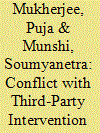

|
|
|
|
|
| Summary/Abstract |
Most real-world conflicts are characterised by the presence of third-party interventions as well as prolonged and revengeful violent interactions between the conflicting parties. However, most of the conflict literature studies the impact of each of these forces – third-party intervention and revenge motivations – on the conflict, in isolation from each other. This paper attempts to fill in this gap and aims to explore the impact of these two forces acting in conjunction with each other on a conflict situation. In fact, we also endogenise the intervention decision of the third party and explore parametric restrictions under which a third party decides to intervene (either as an ally of one of the conflicting parties or as an ‘idealist’ aiming to reduce overall conflict levels) and its repercussions on associated conflict levels. We also present narrative evidences of some real-life conflicts that amply exhibit the two forces of third-party intervention and revenge.
Peace is the only battle worth waging. – Albert Camus
|
|
|
|
|
|
|
|
|
|
|
|
|
|
|
|
| 4 |
ID:
192045
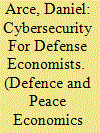

|
|
|
|
|
| Summary/Abstract |
Cybersecurity plays a role in national security. This study introduces cybersecurity concepts in ways familiar to defense economists and identifies parallel methods of analysis in the fields. The theoretical tools of both fields include microeconomics and game theory. These tools enable analyses of phenomena present in both milieus: public goods, externalities, commons, incentives, interdependent security, platform economics, and inefficiency of decentralized decision making. Additional topics include cyber war, cyberterrorism, deterrence and disinformation in cyberspace, price of anarchy, and economics of cryptography.
|
|
|
|
|
|
|
|
|
|
|
|
|
|
|
|
| 5 |
ID:
192051


|
|
|
|
|
| Summary/Abstract |
This work assesses the impact of terrorism suffered by a country on the capacity to attract foreign greenfield investments. To this end, we estimate a theoretically consistent structural gravity equation which accounts for several well-known estimation biases such as ‘home bias’, endogeneity and multilateral resistance. This specification makes it possible to identify the effect of a country-specific time-varying characteristic such as terrorism on bilateral foreign direct investment. We exploit a dataset that covers domestic and foreign investment of 182 countries in the period 2006-2016 on both the extensive and intensive margins. Our study finds that foreign investors are reluctant to invest in countries affected by terrorism and also reduce the amount of their investments in such cases. Sensitivity to terrorism is higher for foreign than for domestic investors. Terrorist attacks have a more intense impact on foreign investors’ decision-making when they are international or when these violent acts hurt governments. However, our results also evidence that good governance appears to be an effective tool for counterbalancing these damages in the eyes of foreign investors.
|
|
|
|
|
|
|
|
|
|
|
|
|
|
|
|
| 6 |
ID:
192047


|
|
|
|
|
| Summary/Abstract |
This study estimates the economic effects of nuclear weapons development efforts in Pakistan using synthetic control group methods. Pakistan started its nuclear weapons program in 1972 and conducted its first test in 1998. This paper focuses on the growth impacts during the 1973 to 1997 period, before Pakistan established itself as a nuclear power. I create a synthetic control group for Pakistan using Per capita Gross Domestic Product (GDP) from the 1950 to 1972. The impact of the nuclear weapons development program is measured as a treatment dummy for the years 1973–1997 in a Difference-in-Difference model. I find that Pakistan’s per capita GDP would have been an average of about $718 per year higher had the country not undertaken the effort to produce a nuclear weapon. This equates to per capita GDP being 27.8% lower on average over the 25-year weapons-development period. Results are robust to several alternative specifications, including country exclusion, sparse synthetic controls, non-outcome characteristics as predictors of GDP, and in-space placebo experiments of differing specifications.
|
|
|
|
|
|
|
|
|
|
|
|
|
|
|
|
| 7 |
ID:
192050
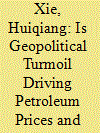

|
|
|
|
|
| Summary/Abstract |
The Iran-Saudi Arabia conflict is an ongoing struggle for influence in the region that has created uncertainty, affected oil prices and regional economics. This paper uses wavelet analysis to examine the frequency and time-varying co-movement and casual nexus between petroleum prices (OP) and financial liquidness (MS) with and without geopolitical risk (GPR). The aim is to test the validity of the monetary equilibrium model from 1988 to 2019. The model is supported by the findings, as both short and medium-term association is found between OP and MS at high frequencies in the presence of GPR. We find a medium-term association between OP and MS in the absence of GPR. The paper’s overall conclusion suggests that GPR affects OP and OP, in turn, impact MS. Diversifying economic activities to minimize oil dependency, which is sensitive to external shocks, is suggested as a mitigation solution.
|
|
|
|
|
|
|
|
|
|
|
|
|
|
|
|
| 8 |
ID:
192046
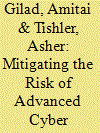

|
|
|
|
|
| Summary/Abstract |
Modern countries employ computer networks that manage organizations in the private and public sectors. Cyber-attacks aim to disrupt, block, delete, manipulate or steal the data held in these networks, which challenge these countries’ national security. Consequently, cybersecurity programs must be developed to protect these networks from cyber-attacks in a manner that is similar to operations against terrorism. This study presents several models that analyze a contest between a network operator (defender) that deploys costly detectors to protect the network and a capable cyber attacker. Generally, when the deployed detectors become more potent or the defender exhibits higher vigilance, the attacker allocates more resources to R&D to ensure that the attack remains covert. We show that detectors may be substitutes, complements, or even degrade each other, implying that defenders must account for the cyber weapons’ characteristics and the attacker’s profile and strategic behavior. We derive the optimal number of detectors when the attacker’s R&D process features R&D spillovers and show that targeted detectors act as deterrents against high-quality weapons only if the attacker’s budget is not substantial. Finally, we demonstrate that common cybersecurity practices may be detrimental from a social-welfare perspective by enhancing an arms race with the attacker.
|
|
|
|
|
|
|
|
|
|
|
|
|
|
|
|
|
|
|
|
|